Did you know that regular drinking isn't just tough on your liver, but it can actually mess with your blood too? Maybe you’ve brushed off feeling tired or light-headed after a few nights out, blaming it on lost sleep or a hangover. But sometimes, the answer is hiding in your bloodstream—and it could be anemia, quietly getting worse every time you raise that glass. Lots of people don’t connect the dots between what they sip and their body’s ability to carry oxygen. But it's all linked.
How Alcohol Interferes With Your Blood
The first thing to understand is what anemia really means. It’s when you don’t have enough healthy red blood cells to move oxygen around your body the way you should. Now, here’s where alcohol steps in and stirs the pot. Alcohol isn’t shy—it can hit every part of your blood-making process. First, it messes with your bone marrow (the actual factory for your red blood cells), slowing down production. Think of it like throwing a wrench in the works—suddenly, you’re just not making enough of those oxygen-carrying cells.
But alcohol doesn’t stop there. It makes your stomach wall less friendly for absorbing nutrients, especially iron, vitamin B12, and folate—key ingredients for building new red blood cells. If you’re sipping regularly, you’re not just blocking those nutrients, you might also be flushing out the ones you do have. And then there’s the hit to your liver, which has a hand in processing nutrients and making proteins vital for blood health. Heavy drinkers often end up low on these critical materials—and their bodies pay the price.
One study out of the UK found that people who had several drinks daily were far more likely to have anemia than those who drank little or not at all. It’s not hard to see why. Your bone marrow slows down, fewer red blood cells are made, and those that survive are weaker and easier to break. Plus, alcohol can damage blood cells directly, making them burst—a process called hemolysis. So not only are you making less, but you’re losing what you already have.
Ever noticed that some heavy drinkers have pale or yellowish skin? That’s not just a sign of a wild weekend; it’s a sign their hemoglobin and red blood cells are tanking. Their bodies can’t keep up with the losses, so oxygen delivery drops—and tiredness, weakness, or even heart palpitations sneak in.
Why Iron Matters—and How Alcohol Drops the Ball
Iron is the superstar of the blood cell world. Your red blood cells can’t do their oxygen-carrying job without it. But alcohol isn’t doing you any favors here. It makes your gut leaky and inflamed, which blocks iron from getting through the wall and into your bloodstream. Heavy drinkers are notorious for being either low on iron or, oddly enough, sometimes having too much—but in a form the body can’t really use.
What’s really wild is the way alcohol and poor diets team up. You’re not just losing iron from the booze; you’re also probably not eating as well when you drink regularly. Many drinkers tend to skip meals, pick at bar snacks, or grab fast food on the run. None of these habits do much for your iron levels. Some studies found that people with alcohol use disorder often have diets sorely lacking in iron-rich foods like spinach, lean red meat, or fortified cereals.
Here’s another sneaky effect—long-term drinkers may notice bloody stools or vomit. That could actually be a red flag for bleeding inside the gut, which not only saps your iron but can lead to chronic, hard-to-shake anemia. Even the mild inflammation from regular drinking can cause tiny amounts of blood loss that add up over time.
It’s not just iron, though. Vitamins B12 and folate are often wiped out in heavy drinkers, making a different flavor of anemia (megaloblastic anemia) where the red blood cells are few and clumsy. When you put all this together, it’s no wonder tiredness and breathlessness are familiar companions for folks with a strong relationship to alcohol. Ever tried climbing the stairs the day after drinking and felt surprisingly short of breath? Sometimes it’s not just dehydration—it could be signs of anemia rearing its head.
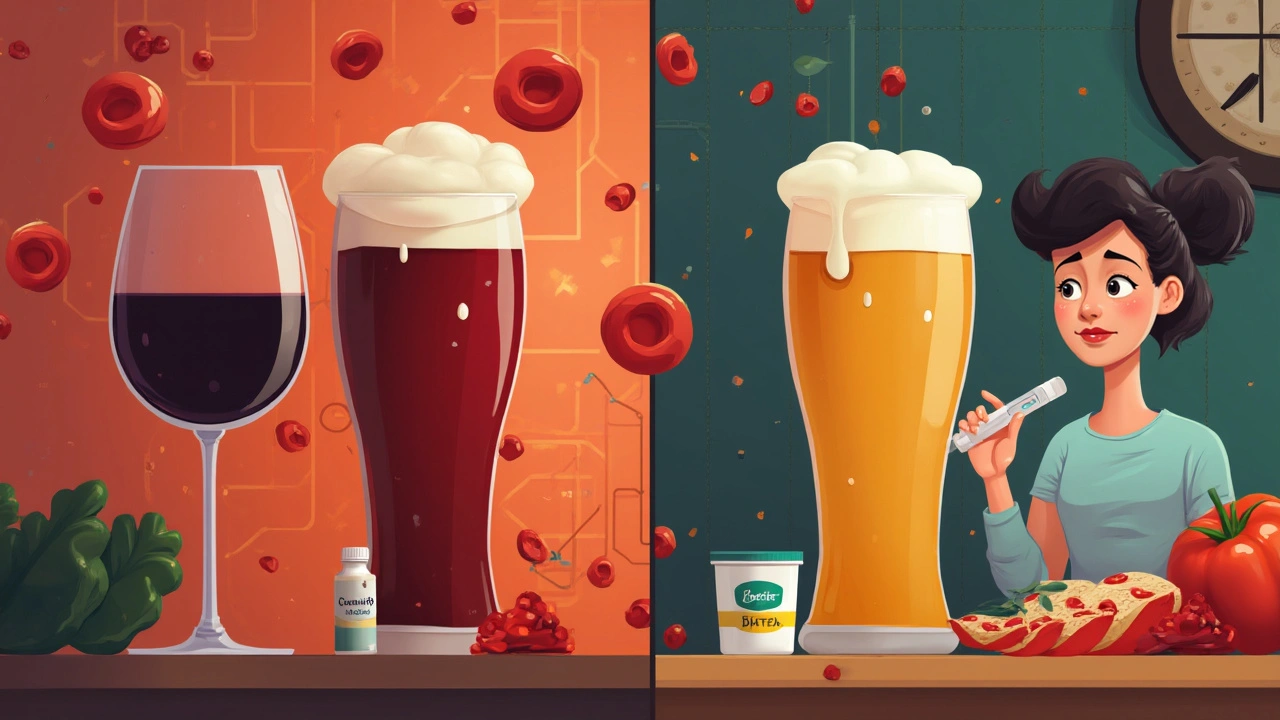
Who’s Most at Risk—and Signs You Shouldn’t Ignore
All drinkers face some risk, but some folks are more likely to run into trouble. Women, for example, are naturally a bit more prone to iron deficiency, since they lose iron during menstruation and often eat less red meat. Throw in a few extra cocktails each week, and boom—the risk skyrockets. Older people, especially those who drink alone or skip meals, fall into this trap too. They might chalk up tiredness, trouble focusing, or feeling cold all the time to “just aging,” but anemia often hides in plain sight.
If you already know you have low iron, deal with GI issues (like ulcers, Crohn’s, or celiac disease), or you’ve gone vegan or vegetarian without paying attention to iron sources, you need to double-check your relationship with alcohol. Add in heavy periods, pregnancy, or past weight-loss surgery, and the combo with regular drinking can quickly lead to real health concerns.
What does anemia from drinking actually feel like? People usually point to feeling wiped out, weak in the legs, dizzy when standing, or getting headaches out of nowhere. Some notice their heart racing when they do something simple, like getting up too fast. Even restless leg syndrome—a constant urge to move your legs, especially at night—has a link to iron deficiency. If any of this hits home and you’re also a regular drinker, it might be time for a check-up and blood test.
There's another angle most folks never consider: medications. If you're pounding back a few drinks while also taking drugs that affect blood (like aspirin or blood thinners), your risk of bleeding and losing iron grows. Chronic drinkers are also more likely to have stomach lining irritation, which just opens the door even wider for anemia to move in. Don’t let embarrassment stop you from talking to a healthcare professional—these symptoms aren’t something to ignore or blame on “getting older.”
How to Drink Smarter If You’re Worried About Anemia
If ditching alcohol isn’t on the table right now, you can still make choices that stack the odds in your favor. First, try not to drink on an empty stomach. Food helps protect your gut and slows alcohol absorption, which means less damage all around. Focus on iron-rich foods when you dine—think beef, chicken, beans, lentils, or dark-green veggies like broccoli and spinach. Pair vitamin C-rich options (like orange juice or tomatoes) with your meals to boost iron absorption.
Skipping heavy drinking sessions helps too. You don’t need to swear off everything, but sticking to guideline amounts—like a drink a day for women and two for men—gives your body a fighting chance to stay balanced. Watch out for sneaky sources of alcohol, like “virgin” cocktails or desserts soaking in liquor. These can add up quick without you even realizing.
If you’ve slipped into the habit of drinking most nights, set a few alcohol-free (AF) days every week. Give your body a break to heal up and rebuild red blood cells. Keep an eye on signs you might be running low on iron or vitamins: long-lasting tiredness, muscle weakness, cold hands and feet, shortness of breath, or bruises popping up out of nowhere.
Iron deficiency is nothing to play with. If you think you’re dealing with anything related to anemia and alcohol, get your blood checked every now and then—especially if you notice symptoms sticking around. When you’re low, sometimes only supplements or medical treatment can get you back on track.
Keep your doctor in the loop if you’re worried, but don’t ignore your own ability to spot patterns. Make a note if you’re always craving ice (a weird but real sign of iron deficiency), feeling exhausted, or noticing heart flutters when you’re just walking around the house. If you want to be stealthy about supporting your blood, you can even sneak iron-boosting snacks like pumpkin seeds, dark chocolate, or fortified granola bars into your day.
And here’s a tip to really help your gut: lay off antacids or acid blockers if you’re drinking and trying to up your iron. Why? Your stomach acid is key for iron absorption, and dialing it back with meds can make things worse. But don’t ditch any meds without talking to your doctor first.
Bottom line: you don’t have to give up all the fun, but you do need to watch for the warning signs. Your blood does more than you probably think, and it’s on you to keep it running smooth—even if you enjoy raising a glass now and then.


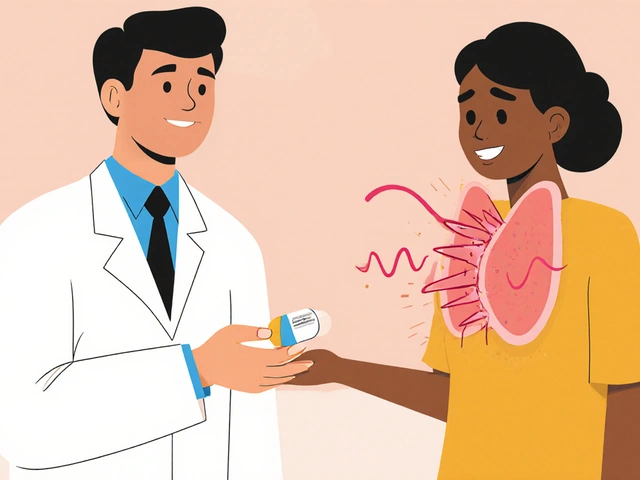
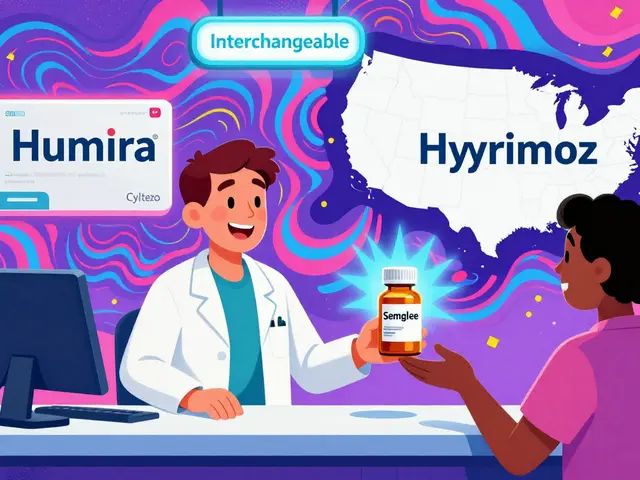

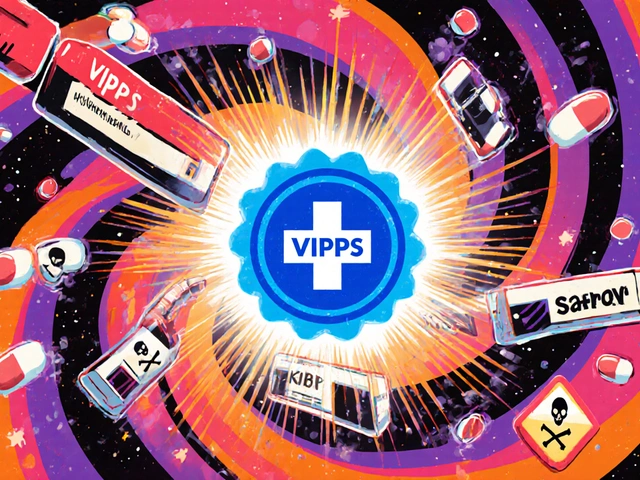
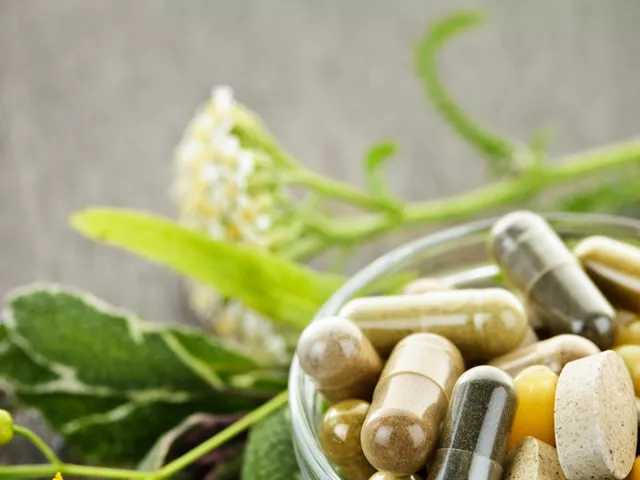

May 18, 2025 AT 15:45
ridar aeen
Been there. Drank too much, felt like a ghost walking around, got my blood checked and turned out I was borderline anemic. Turns out my ‘hangover fatigue’ was just my body screaming for iron. Changed my habits and now I drink once a week max. Life’s better when your legs don’t feel like wet noodles.
May 19, 2025 AT 00:30
Samuel Wood
Alcohol and anemia? Please. I mean, have you even read the WHO guidelines? The real issue here is the lack of nutritional literacy among the general population. Most people think ‘eating spinach’ is a cure-all, but they don’t understand heme vs non-heme iron bioavailability. And don’t even get me started on the myth that ‘vitamin C enhances absorption’-it’s context dependent. Also, typo: ‘sipping’ not ‘sipping’.
May 20, 2025 AT 22:42
chantall meyer
My dad drank daily for 30 years. Never got a blood test. Died at 62 from heart failure. The doc said his RBCs looked like crushed paper. He never knew why he was always so tired. Just thought he was ‘getting old’. Sad how easy it is to ignore the body until it’s too late.
May 21, 2025 AT 16:44
Lorne Wellington
Big respect to the OP for laying this out so clearly 🙌 I’ve worked with folks in recovery who didn’t realize their brain fog and dizziness were tied to iron deficiency. One guy started eating pumpkin seeds daily and took a low-dose iron supplement-his energy came back in 3 weeks. Small changes, huge impact. Also, if you’re drinking, try switching to dry wines or light beers. Less sugar, less inflammation. You got this 💪
May 21, 2025 AT 17:23
Will RD
Drinking causes anemia duh. Also you’re probably eating garbage. Stop being lazy and fix your life.
May 23, 2025 AT 12:28
Jacqueline Anwar
While the article presents a compelling narrative, it lacks rigorous citation of peer-reviewed studies beyond a vague reference to a ‘UK study.’ Without specific journal names, DOI numbers, or sample sizes, this reads more like a wellness blog than medical literature. Furthermore, the conflation of correlation with causation regarding alcohol and hemolysis is methodologically unsound. I urge greater academic accountability in public health messaging.
May 24, 2025 AT 21:35
Ganesh Kamble
bro anemia from alcohol? really? what about all the people who drink and are perfectly healthy? you’re just scared of fun. also iron is overhyped. i eat ramen and drink whiskey every night and i’m fine. your body’s fine. stop scaring people.
May 26, 2025 AT 08:41
Jenni Waugh
Let’s be real-this isn’t about anemia. It’s about accountability. You want to drink? Fine. But don’t blame your fatigue on ‘stress’ or ‘aging’ when you’re guzzling wine while eating chips at 2am. You’re not a victim. You’re a participant. And if your body’s screaming, maybe it’s time to stop pretending you’re not listening. 💅
May 26, 2025 AT 13:44
Theresa Ordonda
Y’all need to stop normalizing this. I had a friend who drank 3 glasses of wine every night and thought she was ‘moderate.’ Turned out her ferritin was 4. FOUR. She was passing out in the shower. Now she’s on IV iron. Don’t be her. 🙏
May 27, 2025 AT 03:53
Judy Schumacher
While the article attempts to convey a public health message, it fundamentally misunderstands the biochemical interplay between ethanol metabolism and erythropoiesis. The reductionist framing of alcohol as a singular villain ignores the multifactorial nature of nutritional anemia, including genetic polymorphisms in MTHFR, chronic inflammation from adipose tissue, and the role of gut microbiota dysbiosis-all of which are exacerbated, but not caused, by alcohol. Furthermore, the suggestion to ‘sneak in iron-boosting snacks’ is clinically naive. One cannot supplement nutritionally through granola bars while maintaining a toxic intake of ethanol. This is not empowerment-it’s pseudoscientific appeasement.
May 27, 2025 AT 15:21
Megan Raines
Wait… so if I drink a glass of wine with dinner and eat a steak, am I fine? Or is it the frequency that kills me? I’m confused now. 😅
May 27, 2025 AT 20:19
Mamadou Seck
My cousin drinks whiskey every night and he’s 70 and still hikes. He says his blood is fine. Maybe this is just fearmongering? I mean, people drank for centuries and lived. Maybe the real issue is modern diets and stress? Not the booze?
May 28, 2025 AT 02:29
Anthony Griek
Just wanted to say thanks for this. I’m a guy who drinks a beer after work to unwind. Never thought about how it might be messing with my iron. I started eating more lentils and skipped drinking on Wednesdays. My energy’s better. Not saying I’m cured, but I’m paying attention now. Small wins, right?